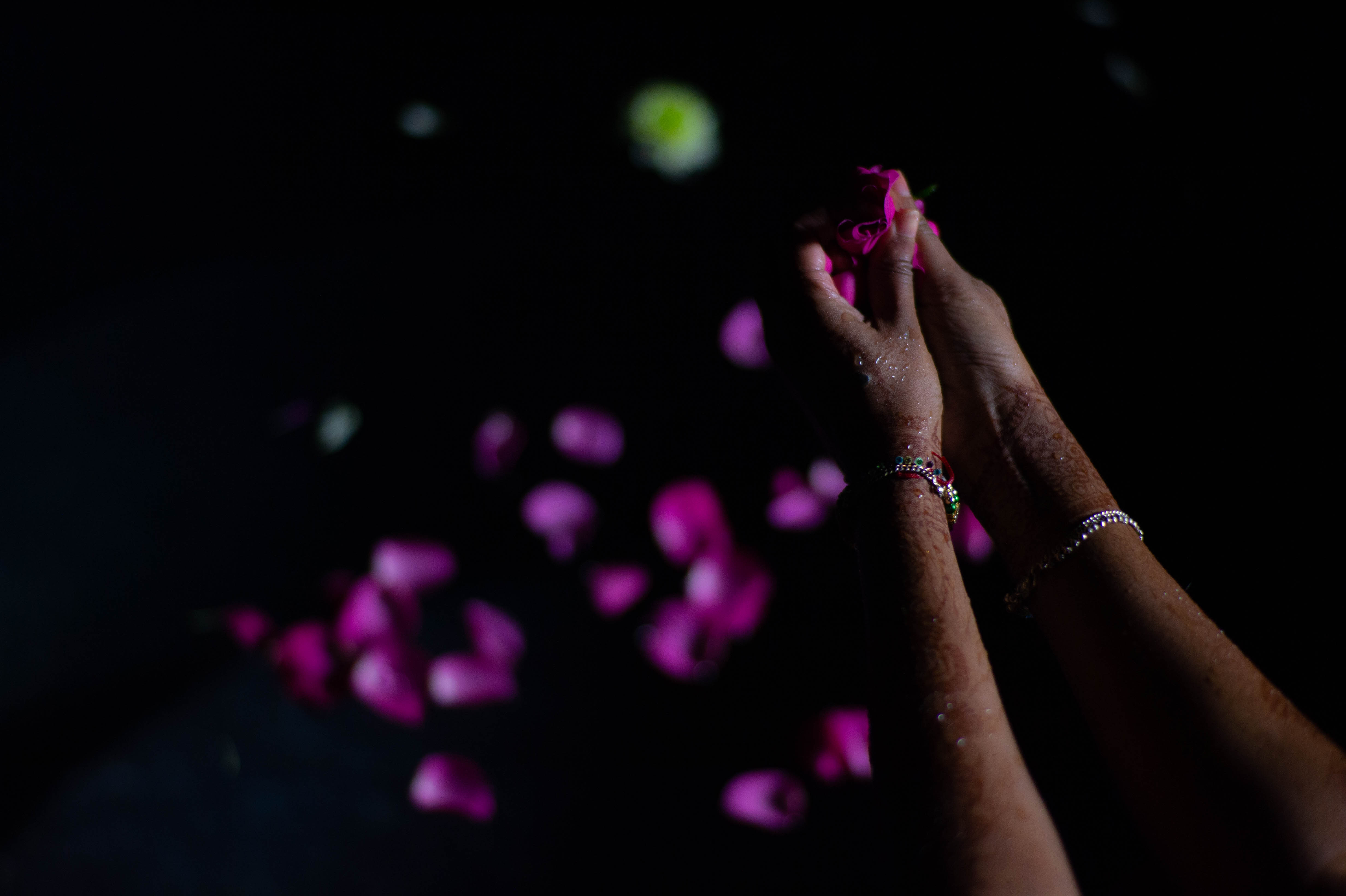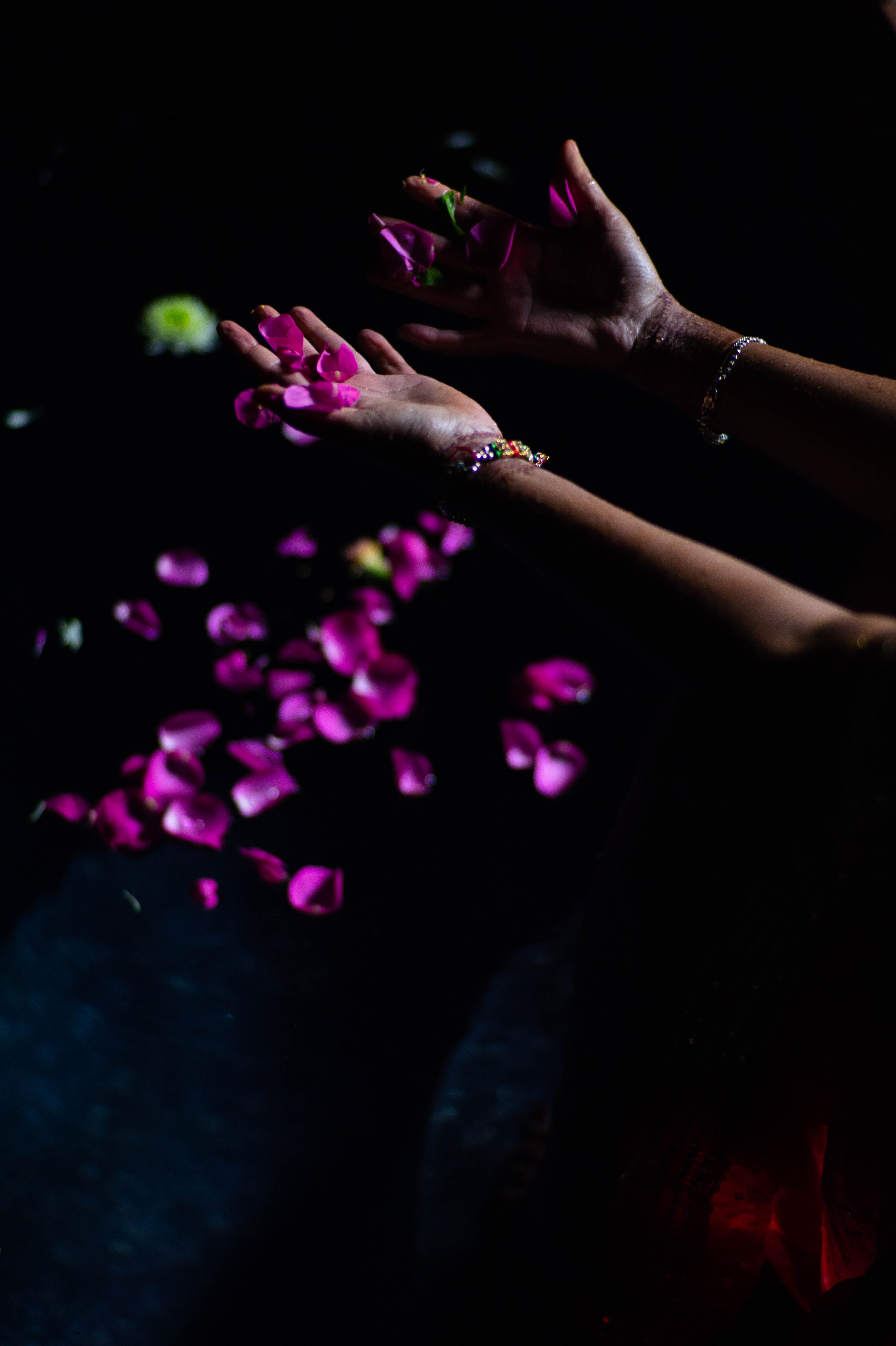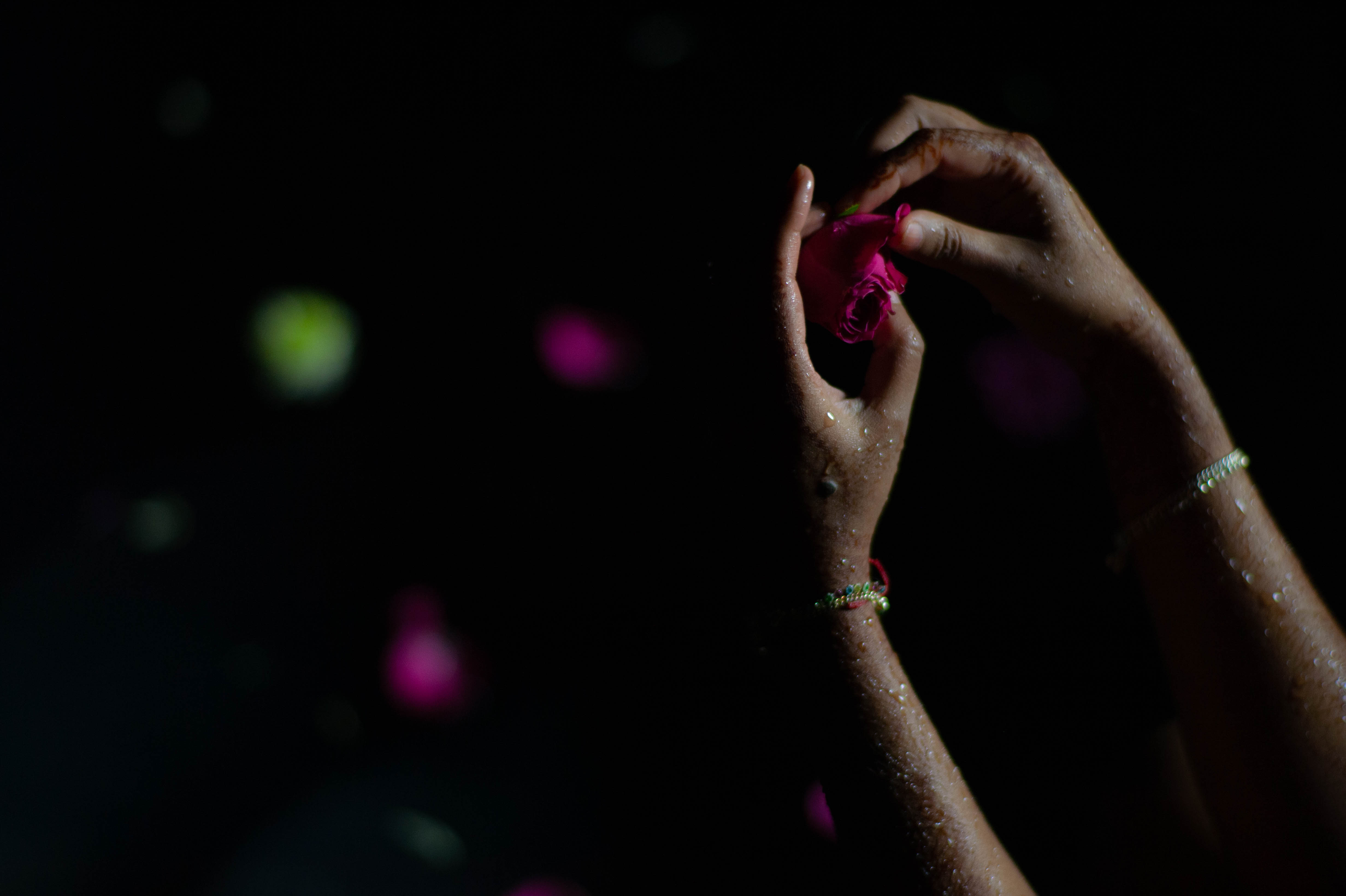Steelwool and Other Paradoxes curator, Boitumelo Makousu, interviews participating artist Sharlene Khan
 Sharlene Khan, Love, loves me not III, 2024, R15,000.00 excluding VAT, CONTACT TO BUY
Sharlene Khan, Love, loves me not III, 2024, R15,000.00 excluding VAT, CONTACT TO BUY
---------
Q: Who is Sharlene Khan?
A: I'm from Durban and have a deep appreciation for movies, music, books, and—above all—food.
Q: What would you say to your younger self?
A: I'd tell her to savor every moment and be kind to herself. Too often, we're caught up in chasing the next big thing—whether it's making a name in art, academia, or any other field. We forget to enjoy the present and appreciate the journey. It's been a tough lesson learning to let go of the constant pursuit and just focus on creating, rather than racing for the next opportunity. The chase takes a toll—mentally, physically, and existentially. We often mask the reality behind our polished social media personas, not showing the grind and sacrifices it takes to stay relevant. Embrace the moment and find joy in the process, rather than just the outcomes
Q: Who has influenced your journey through the arts?
A: It all started in high school with a transformative teacher who was an artist himself. His passion opened my eyes to art as a viable career and introduced me to exhibitions that shifted my perspective. Initially, I pursued microbiology at university because it seemed practical and expected, but I had a revelatory dream that made me realize I couldn't spend my life in a lab. I switched paths, and my art teacher's support was crucial—he even convinced my mother that I was meant to be an artist. Despite her initial disappointment, a family prophecy helped her come around.
At university in Durban, the theory courses were enlightening, offering insights into decolonial education and critical theories. However, the practice side was rigid, forcing specialization without much room for exploration. It wasn't until I encountered Black feminist epistemologies that my thinking expanded profoundly.
Realizing Durban's art scene was limited, I moved to Johannesburg and pursued an MA in Fine Art. Though I faced challenges, including being blacklisted for addressing racism in my work, this adversity pushed me to delve deeper into my research interests. My PhD journey abroad provided a much-needed break from South Africa, allowing me to refine my focus and appreciate my roots.
Now, I navigate a dual career in academia and art. Teaching has become a fulfilling aspect of my life, despite the bureaucracy, while my art practice remains a constant passion. Inspired by Toni Morrison's approach to writing what you wish existed, I create and research to fill gaps in representation and address topics that matter to me. The art world has its challenges, including financial instability, but it fuels my creative drive and ongoing commitment to my craft.

Q:What are your current thoughts on writing in the art world and academia?
A:There’s a significant deficit in writing within the visual arts, art history, and art criticism in South Africa. Instead of using criticism to deeply engage with artworks and expand our creative knowledge, it often gets weaponized to undermine individuals. This lack of investment from commercial galleries in meaningful discourse around artists’ works is troubling. Galleries don’t seem to grasp that establishing a lasting dialogue around an artist’s work enriches both the understanding of the art and its cultural and monetary value.
We rarely see comprehensive catalogs or books accompanying exhibitions, which leaves a gap that falls on individuals to fill. This gap presents a remarkable opportunity to address ongoing issues with Western aesthetics in South African and African art contexts. Writing should be viewed not just as a historical account but as a creative methodology that complements and expands the creative process.
Instead of merely describing, writing should enhance and deepen our understanding of the work, offering new perspectives and extending the creativity inherent in the art itself. It should be seen as an integral part of the creative process, enriching both the artwork and our comprehension of it.
Q: What is your process for creating a body of work, and how does it evolve?
A: My process usually starts with an idea that persists and evolves over time. It can linger for months or even years before manifesting in any tangible form. This idea continually resurfaces, presenting itself in my thoughts and dreams until it demands attention. Visualizations begin to align with this concept, often inspired by personal experiences or themes like love, race, or national identity.
For me, each medium has its own unique process. With painting, especially in oil, I think through the medium itself. It involves wrestling with form and layering, and often, the final piece emerges differently from what I initially envisioned. The process is less about achieving a specific outcome and more about letting the painting reveal itself.
Photography, on the other hand, involves a lot of focus on composition. I don’t see myself as a photographer in the traditional sense, so I’m less concerned with technical perfection and more interested in using images that tell a story, regardless of their quality.
Video work introduces another layer of complexity. It requires careful consideration of how video as a medium communicates effectively. I often start by writing a script, inspired by a key line or concept that emerges. Writing is straightforward for me; I can sit down and draft a script in one go, but the editing process is intricate. As video projects become more elaborate, coordinating with others and translating my vision into practical terms becomes a learning experience.
Overall, the common thread across all mediums is the persistence of the core idea. It remains central throughout the creative process, driving the work forward until it feels fully realized.
Q: What is the intended message behind your work "When the moon wanes"?
A: The work is deeply personal, reflecting my experience of coming of age in 1995, a time when I navigated an interracial relationship amidst complex social and political dynamics. It explores the emotional turbulence of young love—how we carry our personal baggage, the pain of heartbreak, and the unrealistic expectations placed on romantic relationships.
When my heart was first broken, it was a profound moment of personal growth. I learned that heartbreak isn’t just about the end of a relationship but about how we process and move on from it. Many narratives focus on the dramatic end of love, but I’m interested in what happens afterward. How do we continue to love and live after a deep hurt?
The work connects personal experiences with broader myths and epic love stories from various cultures, focusing not just on the pain of heartbreak but on the resilience and ongoing journey of love. It reflects on how broken hearts are not just about individual loss but also about the collective experiences of women who have endured and grown from their pain.
The piece considers love as a foundation within ourselves rather than as something that completes us or fulfills a cultural ideal. It’s about recognizing that you are love itself and that you have the power to shape how you extend love to others. The work reflects on the cliché of “He Loves Me Not” and the deeper truth of self-love and self-worth. It explores how love, despite its challenges, can be a source of personal strength and transformation, expressed through various forms of creative and personal expression.
Q: As one of the founders of the African Feminism Conference, and what are the conference's objectives and significance?
The African Feminism Conference was founded in 2017 by three pracititioners from the fields of humanities, literary studies, English, and fine arts. Our goal was to highlight how creativity is deeply embedded in the lives of African women. It’s not just confined to exhibitions or musical performances but is woven into every aspect of our daily lives—from fashion and hairstyle to how we express love and identity.
The conference aims to bring together African and Black feminists to explore and present their experiences and theories. Central to this is showcasing creativity in various forms—whether through theater, poetry recitals, music, or visual art. Unlike traditional conferences where artworks might be displayed passively, our conference integrates creative presentations with conventional academic papers.
We have sessions that feature creative works alongside scholarly papers, ensuring a dynamic exchange between artistic and academic practices. The conference includes book launches, artistic interventions, and immersive experiences to keep participants engaged and to foster dialogue between theorists and creatives.
AFEMS serves as a vibrant social network where African and Black feminists can freely express their ideas without concern for external judgment. It creates a supportive community for nuanced discussions and encourages young scholars and emerging artists to present their work and receive constructive feedback. The conference also provides opportunities for publication, networking, and mentorship, particularly for emerging women artists and academics.
Q: Where is Sharlene now, and what are you looking forward to?
A: I'm 47 now, and I've realized that I've spent the last two decades constantly striving for various goals, forgetting to truly enjoy life along the way. This has led to a bit of a midlife crisis, compounded by the loss of my parents nearly a decade ago. Losing my childhood home and coming to terms with chronic illness have made me reflect on how much my life has changed.
Midlife is like doing an accounting of your life, and I was never good at accounting—my books never balanced. But instead of feeling bad about that, I'm learning to accept it. I've contributed enough to the history of visual arts to earn my place, and I don't need to exhaust myself writing the next book or giving the next talk. If history forgets me, then so be it.
Now, I'm focusing on things that bring me joy. I want to learn how to roller skate, swim properly, and speak Zulu. I've already started roller skating, and even though I've fallen and injured myself, I’m learning to embrace it. Watching kids fall and get back up reminds me that you can't skate properly without learning how to fall. I've also realized that I need to find enjoyment outside of my work and identity. I want something separate from the pressures of my job, so I'm exploring these new interests. Last year, I recognized that I was at a midlife crisis point, and after going through the typical clichés—like getting a new car—I understood that I was just covering up deeper issues. I'm on a journey to figure out who I am beyond my roles and responsibilities. What does it mean to be this person who no longer has to care for others all the time, who no longer has to strive for validation in the art world? It’s a big journey, one that won’t be completed in a year or two.
Art is still a part of my life, but now it's more about enjoyment rather than trying to meet the art world's expectations. I'm also working on getting rid of toxic behaviors, both towards others and myself. I want to learn to enjoy my life without worrying about making history or being remembered. Who cares, really? I’ve spent so much of my life focused on others, and now I realize that I only have this one life. So, maybe for the next few years, I’ll focus on doing things that bring me pure joy, even if they seem selfish. I'm not looking to the future with specific goals in mind—I'm just trying to be present and enjoy the moment.
Even though I often feel like I'm on the verge of giving up, there’s always another project on my mind. I have a few projects that are halfway done, and I need to wrap them up before I take stock of everything. I want to focus on writing about things and people I truly love.
 Sharlene Khan, Love, loves me not I, 2024, R15,000.00 excluding VAT, CONTACT TO BUY
Sharlene Khan, Love, loves me not I, 2024, R15,000.00 excluding VAT, CONTACT TO BUY
Q: What do you feel was your proudest moment or accomplishment?
A: Creating the series "When the Moon Wanes" is probably the achievement I'm most proud of. It was based on the lives of my mother and grandmother, and finding the right language to articulate their experiences was incredibly challenging. It took a long time to bring it to life, but the impact it had on people when they viewed it made all the effort worth it.
Q: What advice would you give to young women?
A: Honestly, I don’t really have advice anymore. I’d say, don’t be afraid to mess up. Life can feel overwhelming and harsh, and mistakes might seem like they’ll define you forever, but they don’t. Life gives you chances to correct your course, so if you mess up, just move on and be kind to yourself.
Figure out what self-love truly means beyond all the clichés. Self-love isn’t just about taking bubble baths when you’re mentally falling apart. While that might offer temporary relief, it doesn’t address the underlying issues. If you’re struggling, seek therapy, talk to people, and do the hard work of healing and changing your mindset. Overcoming negative thought patterns and manifesting the life you want requires a lot of effort, especially in a society that keeps us constantly spinning our wheels. But it’s worth it to take that time and effort for your well-being.
Further Reading In Articles
African Artist Directory















